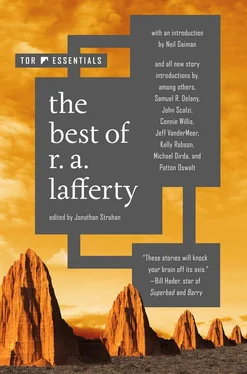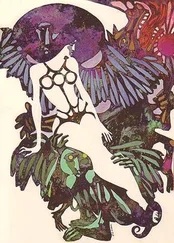And there were a few more seconds of those intrusive “ghost” voices breaking into the closing moments of the pastoral drama.
“Clarie, I have been took bad, for a big wad, and I don’t know how it happened. There is something funny about it all. There was something funny and familiar about that Masked Alternate Rider for number seven. (I swear that I know him from somewhere!) And there has always been something double funny and familiar about that gambler Rakesly Rivertown. (I swear and be damned if I don’t know him from somewhere!)”
“Don’t worry about it, Aurie. You are so smart that you will have all that money made back in no time at all.”
“Yes, that’s true, I will. But how can I write and produce and direct a drama and then get taken in it and not know what happened?”
“Don’t worry about it, Aurie.”
I myself doubt very much whether Aurelian Bentley knew about the “slow sounds” from nowhere-town that sometimes broke into the playing of his dramas, much less the “slow smells” which now began to give the dramas a character all their own.
4. The Voyages of Captain Cook was the fourth of the Bentley-produced television dramas of the year 1873. In this, Clarinda Calliope played the role of Maria Masina, the Queen of Polynesia. If The Great Bicycle Race was a journey into summertime, The Voyages of Captain Cook was a journey into tropical paradise.
Hubert Saint Nicholas played Captain Cook. Inspiro Spectralski (Is he a Man? Is he a Fish?) played the Shark God. Leslie Whitemansion played the Missionary. X. Paul McCoffin played the Volcano God. Torres Malgre played the God of the Walking Dead. Jaime del Diablo played Kokomoko, the bronzed surf boy and lover boy who was always holding a huge red hibiscus bloom between his white teeth.
The people of the South Sea Islands of the Captain Cook drama were always eating possum and sweet potatoes and fried chicken (a misconception) and twanging on little banjos (another misconception) and talking southern U.S. Darky Dialect (but these ghost voices were not intended to be heard on the television presentation).
The complete libretto for The Voyages of Captain Cook has survived, which makes us grateful for those that have not survived for several of the dramas. The story is replete. It is better to disregard the libretto with its simultaneous curses invoked by the Shark God, the Volcano God, and the God of the Walking Dead, and to give oneself over to the charm of the scenery, which is remarkable, considering that it was all “filmed,” or “selenium-matrixed,” in the salt swamps of New Jersey.
The anomalous intrusive voices are in this drama again, as they will be in all the subsequent dramas.
“A ‘South Sea Bubble,’ yes, that’s what I want, Aurie, one that can’t burst. Use your imagination (you have so very much of it) and your finances (you have so very much of those) and come up with something that will delight me.”
“I swear to you, Clarie, as soon as my finances are in a little better order, I will buy any island or group of islands in the Pacific Ocean for you. Do you hear me, Clarie? I will give you any island or group you wish, Hawaii, Samoa, Fiji. Name it and it is yours.”
“So many things you promise! But you don’t promise them on paper, only on air. Maybe I will find a way to make the air retain the promises you make.”
“Not on paper, not on air, Clarie, but in real life. I will make you the real and living Queen of Polynesia.”
The essence of the South Sea appeal is just plain charm. It may be that this Bentley drama, The Voyages of Captain Cook, was the original charm bush whence many things bloomed. No, in things of this sort, it is not necessary that a scion ever be in contact with its source or even know its source. Without the Voyages would there ever have been a Sadie Thompson, would there have been a Nellie Forbush? Would there have been a Nina, daughter of Almayer? Well, they wouldn’t have been as they were if Clarinda Calliope hadn’t, in a way, played them first. Would there have been a White Shadows of the South Seas if there hadn’t first been The Voyages of Captain Cook ? No, of course there wouldn’t have been.
5. Crimean Days was the fifth of the Aurelian Bentley television dramas. In this, the multitalented Clarinda Calliope played the role of Florence Nightingale, of Ekmek Kaya, a Turkish lady of doubtful virtue who was the number-four wife and current favorite of the Turkish admiral, of Chiara Maldonado, a young lady camp follower with the army of Savoy, of Katya Petrova, who was a Russian princess as well as a triple spy, and of Claudette Boudin, a French lady journalist. Clarinda also masqueraded as Claudette’s twin brother, Claude, a colonel with the French forces, and as such she led the French to a surprising victory over the Russians at Eupatoria. The unmasqueraded Claude himself was played by Apollo Mont-de-Marsan, a young actor making his first appearance in the Bentley dramas.
The Crimean War was the last war in which the field officers of all sides (Leslie Whitemansion was a British field officer, Kirbac Fouet was a French, Jaime del Diablo was an officer of the forces of Savoy, Torres Malgre was the Turkish admiral, Inspiro Spectralski was a general of the Czar, X. Paul McCoffin was a special observer of the Pope), after their days of tactical maneuver and sometimes bloody conflict, would dress for dinner and have formal dinner together. And it was at these dinners that Clarinda Calliope, in her various guises, shone.
There was a wonderful and many-leveled table intrigue, and I believe that more and more of it will come through every time the drama is replayed. And it was here in this drama that one of the most strange of the Bentley-effect phenomena first appeared. There is unmistakable evidence that some of the subvocalizations (thoughts) of the people were now to be heard as “slow sound,” which was really selenium triggered “slow thought.” Some of these manifestations were the role thoughts of the actors so strangely vocalized (Clarinda Calliope, for instance, could not speak or think in any tongues except English and her own Pennsylvania Dutch in normal circumstances: but in her triple spy roles we find her thinking out loud in Turkish and Greek and Russian); and other of the vocalizations are the real thoughts of the actors (the amazingly frank intentions of Leslie Whitemansion and of the new Apollo Mont-de-Marsan as to their lady loves of the evening after they should have received their two-dollar actors’ fee for the day).
It was a wonderful play and too intricate to be described. This one, above all, has to be seen. But again there was the anomalous intrusion of voices that were not a part of the scenes of the play: “Get rid of that Greek Wop kid, Clarie. I told him he was fired, and he said that he would stick around and work for nothing. He said he loved the fringe benefits. What are fringe benefits? I told him I’d run him off, and he said that this was the free state of New Jersey and that no one would run him off. I won’t have him around.”
“Oh, Aurie, there isn’t any Greek Wop kid. That was me playing that role too. Am I not talented to play so many roles? And you will not fire me from this role. I will continue to play it, and I will be paid for it. It isn’t the principle of the thing either: it’s the two dollars.”
“Yes, I understand that much about you. But you say that was you playing the part of that smart-mouth Apollo Dago Greek? That couldn’t be. I’ve seen you both at the same time. I’ve seen you two together too many times. I’ve seen you smooching each other.”
“Ah, Aurie, that was quite an advanced technique and illusion, not to mention double exposure, that I used there. What other actress could play both roles at once and get away with it?”
Читать дальше




![Рафаэль Лафферти - Дни, полные любви и смерти. Лучшее [сборник litres]](/books/385123/rafael-lafferti-dni-polnye-lyubvi-i-smerti-luchshe-thumb.webp)
![Рафаэль Лафферти - Лучшее [Сборник фантастических рассказов]](/books/401500/rafael-lafferti-luchshee-sbornik-fantasticheskih-ra-thumb.webp)